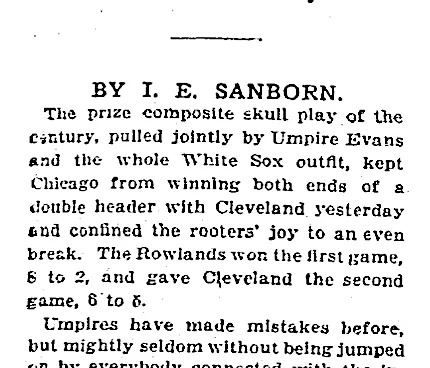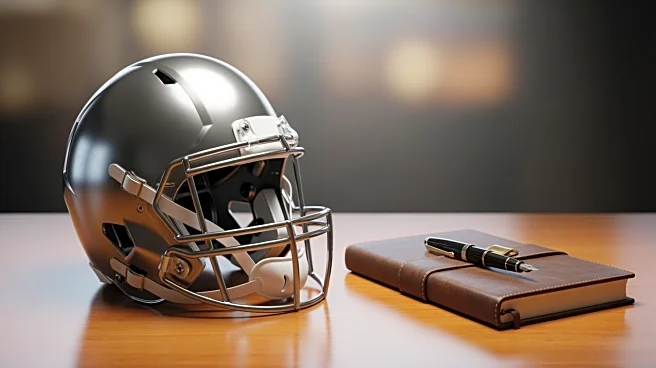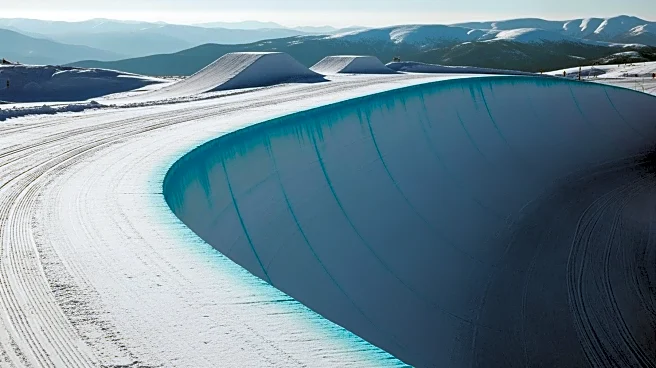1915
The White Sox split a doubleheader at Cleveland, winning, 8-2, in the opener and losing, 6-5, in the nightcap — or did they?
Cleveland was aided by an umpire error in the fourth inning of its win,
after rallying to tie the game, 2-2. It was then that, with a runner on first, Jay Kirke struck out on an Eddie Cicotte wild pitch and advanced all the way to second base on the “dropped” strike. The White Sox were faced with a second-and-third situation that should never have been, as a runner can only advance to first on a “drop” if first base is unoccupied. Both runners came around to score, putting Cleveland up, 4-2.
No one on the field caught the mistake, and in fact it was the writers on press row who passed word down to White Sox second-sacker Eddie Collins, who filed a protest of the game after the fifth inning.
The game ended as a Cleveland win, 6-5. Home plate umpire Billy Evans admitted his mistake, which surely aided the successful White Sox protest of the game — which was erased from the books and made up on September 29. That game ended with a 13-6 White Sox win.
1916
Going 2-for-3 with a double and a walk in a 1-0 win at St. Louis, Eddie Collins began a 20-game hit streak that would end as the longest yet in White Sox history. Collins hit .464 over the course of the run, which lasted the balance of September and pushed the Pale Hose to wins in 15 games. Collins had an on-base of .543 and .594 slugging over the 20 games as well.
This mark was snapped just four years later, in 1920, by … Collins! The future Hall-of-Famer had a hitting streak of 22 games in August-September. And that mark would stand for 14 years, until … well, read right below this.
1936
Luke Appling’s club-record 27-game hitting streak ended in Boston, courtesy of pitcher Wes Ferrell. Appling went 0-for-2 with two walks in a 3-2 White Sox win to open a doubleheader. Appling would also go hitless in the nightcap, a 5-0 White Sox loss. However, in the next Pale Hose game (September 5), Appling got hot again and went on an 11-game hitting streak.
Appling’s 27-game streak would stand as a White Sox record until 2004, when Carlos Lee broke it by hitting in 28 straight games.
1952
Dick Littlefield of the St. Louis Browns pitched a superlative game, throwing a two-hitter at the White Sox in front of 10,007 fans at Comiskey Park. However, it being the 55-78 Browns, Chicago still won the game, on a home run from Sam Mele in the seventh inning. Littlefield had just one strikeout and notched just a 73 game score, while White Sox winning pitcher Saul Rogovin equaled Littlefield’s complete game but threw a shutout, with five Ks, good for a 75 game score.
1990
White Sox relief pitcher Bobby Thigpen set the major league mark with his 47th save of the season, in a win over Kansas City. He’d finish the year with 57 saves, which stood as the all-time record until 2008.
For the season, Thigpen also won four games and had an ERA of 1.83 … naturally he was named the Fireman of the Year, as well as an American League All-Star.
2022
He had been one of the most dominant pitchers in baseball for the season and on this night, Dylan Cease turned it up a notch against the Twins.
Cease had a no-hitter with two outs in the ninth inning at Guaranteed Rate Field before a slider cut too much of the plate to Luis Arráez. Arráez didn’t miss it, driving a solid single into right-center field, ending the no-hitter. Cease finished with a brilliant one-hitter in Chicago’s 13-0 win. Cease struck out seven in the game, recording his 13th win of the year.
It was the 68th one-hitter in White Sox history. Cease’s game score of 90 was the best of his career, and tied for the 76th-best in franchise annals.









